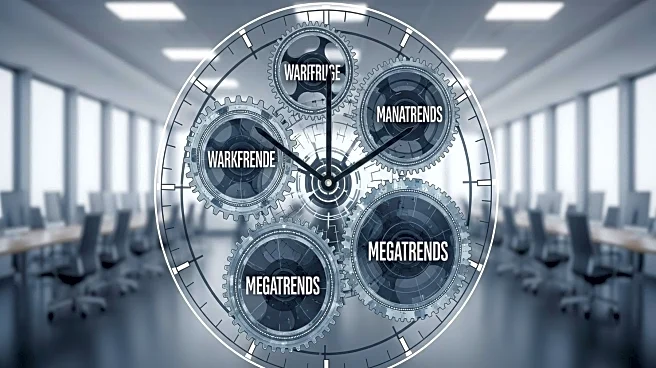What's Happening?
HR leaders are being advised to prepare for five significant megatrends that are reshaping workforce management. These include global instability, a shift in CEO priorities away from workforce focus, ongoing power struggles between employees and employers, a mismatch between population and skills, and increased AI use cases. HR must adapt to geopolitical crises, prioritize employee needs amidst growth-focused strategies, address trust issues, and rethink work processes due to demographic changes. The integration of AI into HR practices is expected to drive systemic change, requiring careful management to avoid inequities.
Why It's Important?
These megatrends highlight the evolving challenges HR leaders face in maintaining workforce stability and productivity. The shift in CEO priorities away from workforce concerns could lead to increased employee burnout and turnover, placing greater responsibility on HR to advocate for employee needs. The rise in union support and trust issues necessitates proactive measures to strengthen employee-employer relationships. As AI becomes more integrated into HR processes, leaders must ensure equitable implementation and prepare for changes in managerial roles. Addressing these trends is crucial for sustaining organizational growth and employee satisfaction.
What's Next?
HR leaders are encouraged to develop strategies to navigate these megatrends, including scenario planning for geopolitical crises, advocating for employee needs in growth strategies, and fostering trust through transparent communication. The integration of AI into HR practices will require careful measurement and management to ensure positive outcomes. As demographic shifts continue, HR must focus on aligning workforce skills with organizational needs and involve employees in automation decisions. These steps will be essential for adapting to the changing landscape of workforce management.
Beyond the Headlines
The emphasis on AI and automation in HR practices raises ethical considerations regarding employee privacy and job security. HR leaders must balance technological advancements with human-centric approaches to maintain trust and engagement. The demographic changes and skills mismatch highlight the need for innovative solutions to workforce planning, potentially leading to shifts in educational and training programs. These developments could influence broader societal changes in how work is perceived and valued.









